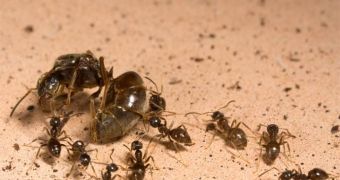While, most of the times, ants are extremely civilized creatures, working together for the common good, they are sometimes more vicious than humans. Their colonies have equal chances of surviving or dying during their first year, so the amount of workers queens produce is absolutely essential. Several queens may exist in a single nest at the beginning, producing workers side by side, and sending them out to meet the needs of the collectivity. But they are not too happy about living and sharing the ultimate power with others like them, and eventually violent, chemical warfare ensues, LiveScience reports.
This leads to the new conclusion that a group of researchers drew based on careful observations of ants. The experts noticed that, in some instances, queens would sacrifice the good of the colony for their own well-being, which is something that human leaders are known to do as well. At times, the queens may even produce fewer workers, thus endangering the colony, only to serve their own interests. Such colonies function like super-organisms of sorts, therefore the common good is sometimes put on hold, until “personal” matters are taken care of. In such instances, ant workers are simply coerced into devouring all but one queen, so that “political stability” is restored.
Naturally, this mechanism doesn't work all the time, in the sense that workers may eventually end up killing off all the queens. “Workers are much smaller and do minimal damage alone, so it can take several days of sustaining biting/acid spraying before they bring her down – perhaps she just dies of thirst. Usually they stop when one is left, but occasionally they are so revved up that they kill all the queens,” University of Copenhagen Center for Social Evolution expert Luke Holman says. He adds that this is the equivalent of human suicide, given that the queens are the only ones capable of passing on genetic material to future generations.
The expert adds that the primary reason why queens produce less workers when others are around is because producing offspring is a very energy-intensive process. By not engaging in it, the insects keep much more strength intact, for fighting off potential hordes of worker ants that are pointed at them. The experts also learned the basis of the primordial legal system the ants employed that had allowed them over the years to construct their impressive societies. Selfishness was severely punished, it was discovered. Ant queens that produce less offspring have less strong odors, which makes them prime targets for angry mobs of worker ants. Those who produce more workers have the highest chances of survival.
“Execution of the most selfish ant queens by workers would increase the incentive for queens to be team-players that work hard to help the colony. This rudimentary 'legal system' could have helped ants to evolve their highly advanced societies, just as in humans,” Holman explains. Details of the investigation appear in the February 24 issue of the respected scientific journal Proceedings of the Royal Society B.

 14 DAY TRIAL //
14 DAY TRIAL //